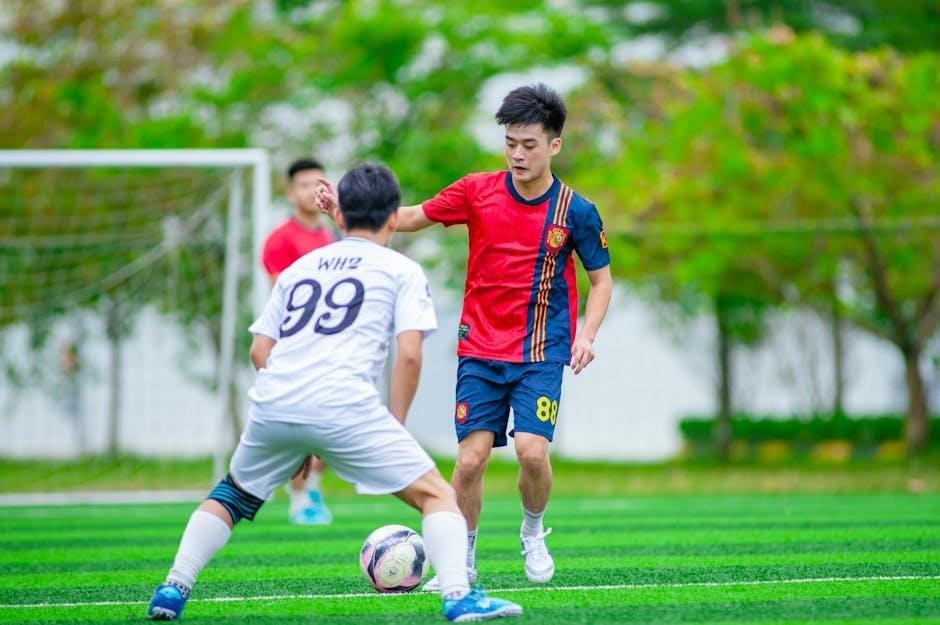off-season soccer training program pdf
Off-season soccer training is a critical period for players to enhance skills‚ recover‚ and prepare for the upcoming season. A structured program ensures improvement and readiness.
Importance of Off-Season Training
Importance of Off-Season Training
Off-season training is crucial for soccer players to maintain fitness levels‚ recover from the previous season‚ and address weaknesses. It allows players to focus on building strength‚ endurance‚ and technical skills without the pressure of competition. This period is essential for long-term development‚ as it provides time to refine tactics and improve overall performance. By prioritizing recovery and structured workouts‚ players can return to pre-season stronger‚ faster‚ and more prepared. Consistency during the off-season also fosters mental discipline and resilience‚ which are vital for success on the field. Ultimately‚ a well-planned off-season program ensures players are physically and mentally ready to excel in the upcoming season.
Setting Goals for the Off-Season
Setting Goals for the Off-Season
Setting clear and specific goals is essential for a productive off-season. These goals should be SMART—Specific‚ Measurable‚ Achievable‚ Relevant‚ and Time-bound. Identify areas needing improvement‚ such as strength‚ endurance‚ or technical skills‚ and create a roadmap to address them. Break down larger objectives into smaller‚ manageable tasks to track progress effectively. For example‚ aim to increase sprint speed or master a specific dribbling technique. Regularly reviewing and adjusting these goals ensures accountability and keeps the training focused. A well-defined plan helps maintain motivation and direction‚ ensuring the off-season is used efficiently to enhance overall performance. This structured approach guarantees players return to the field ready to excel.
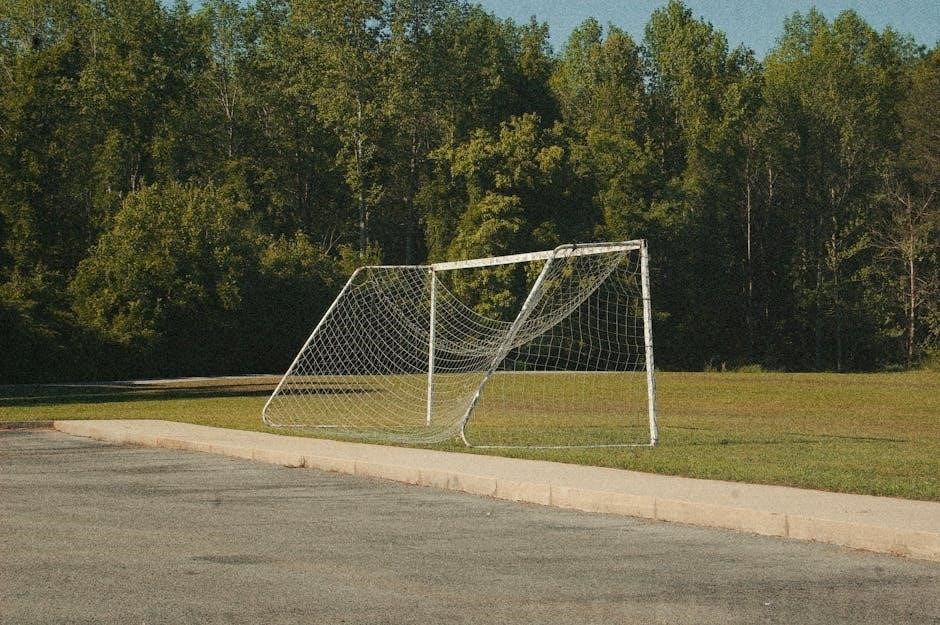
Key Components of an Off-Season Program
A well-rounded off-season program includes physical recovery‚ strength building‚ technical drills‚ tactical awareness‚ and mental preparation. It balances conditioning with skill development to enhance overall performance.
Physical Recovery and Injury Prevention
Physical Recovery and Injury Prevention
Physical recovery and injury prevention are the foundation of any successful off-season soccer training program. After an intense season‚ players need time to heal and rejuvenate their bodies. This phase focuses on reducing muscle soreness‚ improving flexibility‚ and restoring joint mobility. Techniques such as stretching‚ foam rolling‚ and low-intensity cardio help promote blood flow and repair damaged tissues. Strengthening the core and key muscle groups through targeted exercises can prevent future injuries. Incorporating rest days and proper sleep schedules ensures the body has adequate time to recover; A well-structured recovery plan not only prevents injuries but also prepares the athlete for the demands of the upcoming season.
Building Strength and Endurance
Building Strength and Endurance
Building strength and endurance is a cornerstone of off-season soccer training‚ enabling players to meet the physical demands of the sport. A well-designed program focuses on exercises like squats‚ lunges‚ and plyometrics to enhance power and stability. Resistance training helps improve muscle mass and durability‚ reducing the risk of injuries. Endurance is developed through aerobic and anaerobic exercises‚ such as interval runs and high-intensity drills‚ to boost stamina and speed. Progressive overload is key‚ gradually increasing intensity to avoid plateaus. By combining strength and endurance workouts‚ players achieve a balanced physical foundation‚ ensuring they return to the field stronger‚ faster‚ and more resilient for the upcoming season.
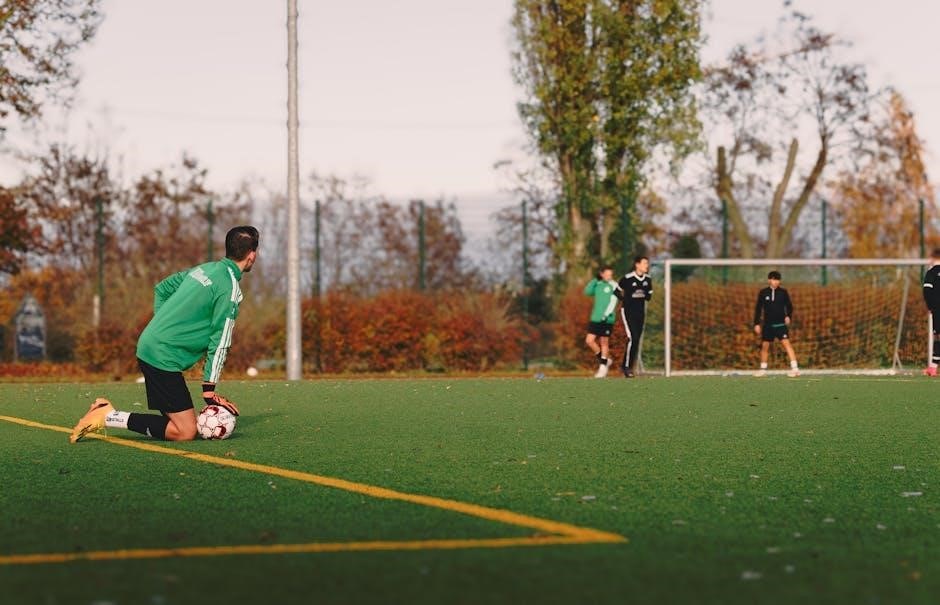
Structured Training Schedule
A well-organized training schedule is vital for off-season success. It includes weekly workout plans‚ periodization‚ and a balance of technical drills‚ strength sessions‚ and tactical strategies to maximize progress and avoid overtraining.
Weekly Workout Plan
Weekly Workout Plan
A well-structured weekly workout plan is essential for off-season soccer training. It typically includes 3-4 training days‚ with each day focusing on specific aspects such as strength‚ endurance‚ agility‚ and technical skills. For instance‚ Monday might focus on strength training with exercises like squats and lunges‚ while Tuesday could involve agility drills and ball control. Wednesday is often a rest day or active recovery‚ such as light jogging or stretching. Thursday might focus on endurance with long runs or high-intensity interval training (HIIT)‚ and Friday could involve tactical drills and small-sided games. The weekends are usually reserved for scrimmages or friendly matches to apply the skills learned during the week. This balanced approach ensures that players improve both physically and technically without overtraining. Proper scheduling also allows for adequate recovery time‚ which is crucial for injury prevention and overall performance enhancement. By following a consistent weekly plan‚ players can progressively build their fitness levels and be fully prepared for the upcoming season. Consistency and adherence to the plan are key to achieving the desired results.
Periodization of Training
Periodization of Training
Periodization of training involves structuring the off-season into specific phases to optimize performance and recovery. This approach ensures a gradual progression of intensity and focus‚ preventing burnout and overtraining. Typically‚ the off-season is divided into blocks‚ such as foundation building‚ strength development‚ endurance enhancement‚ and pre-season preparation. Each phase lasts 4-6 weeks‚ allowing players to adapt and improve without plateaus. For example‚ the first phase might focus on general fitness and recovery‚ while the next phase introduces strength and power exercises. The final phase mimics pre-season demands‚ incorporating tactical drills and small-sided games. This structured approach ensures players peak at the right time‚ entering the season fresh and prepared. Proper periodization is key to long-term development and success.
Technical Skills Development
Off-season training emphasizes refining dribbling‚ ball control‚ and technique through targeted drills. Focused practice enhances precision and confidence‚ ensuring players master essential soccer skills effectively.
Dribbling and Ball Control Drills
Dribbling and ball control are foundational skills refined through specific drills during the off-season. Players practice techniques like zig-zag runs‚ cone weaving‚ and figure-eight drills to improve precision. Ball control exercises‚ such as toe taps and inside-outside cuts‚ enhance dexterity and confidence. Small-sided games incorporate these drills‚ simulating game scenarios to apply skills under pressure. Consistent practice ensures players can maintain possession and outmaneuver opponents. These drills not only build technical proficiency but also adaptability‚ crucial for dynamic match situations. Dedicated focus on dribbling during the off-season equips players with the tools to dominate on the field‚ making them more effective playmakers and goal threats.
Shooting and Finishing Techniques
Shooting and finishing are vital skills refined during the off-season. Players engage in structured drills to improve accuracy‚ power‚ and technique. Drills include shooting from various distances‚ angles‚ and situations‚ such as breakaways or one-on-one with goalkeepers. Emphasis is placed on proper ball striking‚ follow-through‚ and composure under pressure. Incorporating game-like scenarios‚ such as small-sided games or crossed balls‚ enhances decision-making and reaction speed. Video analysis and feedback help players refine their form and identify areas for improvement. Consistent practice ensures players develop the confidence and precision to capitalize on scoring opportunities‚ making them more effective and clinical in front of goal during the season.
Tactical Awareness and Strategy
Tactical awareness and strategy focus on understanding game dynamics‚ positioning‚ and decision-making. Players learn to read the game‚ anticipate movements‚ and execute effective plays during matches.
Understanding Game Intelligence
Understanding Game Intelligence
Game intelligence involves reading the field‚ anticipating opponents’ moves‚ and making split-second decisions. It enhances spatial awareness‚ allowing players to position themselves effectively and exploit weaknesses. During the off-season‚ focused drills and video analysis can improve this skill‚ helping players recognize patterns and think critically. Incorporating small-sided games and scenario-based exercises further refines their ability to adapt and react intelligently under pressure. Developing game intelligence transforms a player from a skilled individual into a strategic asset for their team‚ capable of influencing the outcome of matches through smart play.
Positional Awareness and Decision-Making
Positional Awareness and Decision-Making
Positional awareness is the ability to understand and adapt to the dynamics of the game‚ ensuring players are in the right place at the right time. Off-season training focuses on enhancing this skill through drills that simulate game scenarios‚ encouraging players to read the field and anticipate movements. Decision-making is refined by practicing quick reactions and logical thinking under pressure. Players learn to balance risk and reward‚ making smarter passes‚ and identifying scoring opportunities. By improving these skills‚ players become more effective in controlling the flow of the game and contributing to their team’s success‚ even in high-stakes situations.
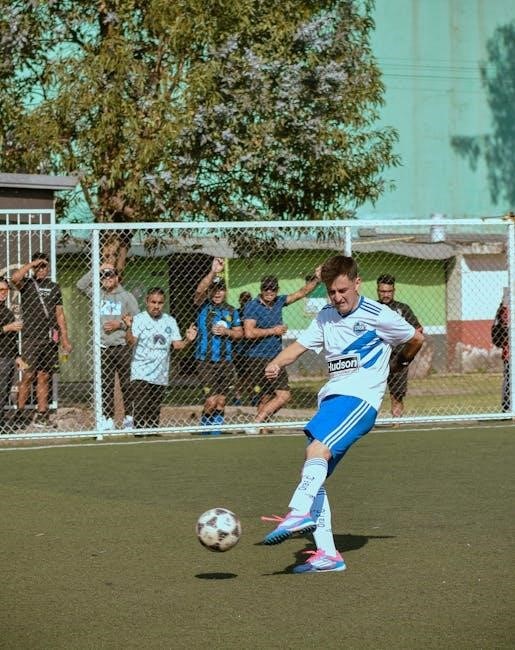
Speed and Agility Training
Speed and agility are vital for soccer‚ enabling quick movements and sharp changes in direction. Off-season drills focus on improving acceleration‚ deceleration‚ and reaction time to enhance performance.
Acceleration and Deceleration Drills
Acceleration and deceleration drills are essential for improving speed and control in soccer. These exercises focus on short‚ explosive sprints and rapid stops to mimic game scenarios. Players can perform hill sprints for power and resistive band training to enhance acceleration. Deceleration drills‚ such as ladder exercises and cone drills‚ improve agility and balance. Proper technique is crucial to avoid injuries and maximize effectiveness. Incorporating these drills into a structured off-season program ensures players develop the ability to quickly change speed and direction‚ giving them a competitive edge on the field. Consistency in these drills translates to better performance during matches.
Change of Direction Exercises
Change of direction exercises are vital for enhancing agility and reaction time in soccer. Drills such as ladder drills‚ cone exercises‚ and shuttle runs are effective for improving quick turns and sharp cuts. Players can also use resistive band training to strengthen muscles used in rapid changes of direction. These exercises simulate game-like scenarios‚ helping players anticipate and react faster. Incorporating these drills into an off-season program ensures better control and precision on the field. By focusing on explosive movements and rapid transitions‚ players can gain a competitive edge in maneuvering the ball and outperforming opponents. Consistent practice of these exercises is key to mastering directional changes during matches.
Nutrition and Recovery
Nutrition and recovery are essential for optimal performance‚ focusing on a balanced diet rich in proteins‚ carbs‚ and hydration. Adequate sleep and stretching aid muscle repair and growth.
Balanced Diet for Optimal Performance
Balanced Diet for Optimal Performance
A well-balanced diet is crucial for soccer players during the off-season‚ ensuring they fuel their bodies for recovery‚ growth‚ and enhanced performance. The diet should focus on lean proteins‚ complex carbohydrates‚ and healthy fats to provide sustained energy and support muscle repair. Hydration is equally important‚ with players needing to consume plenty of water throughout the day. Meals should be timed appropriately around training sessions to maximize energy levels and recovery. Incorporating a variety of fruits‚ vegetables‚ and whole grains ensures essential vitamins and minerals are consumed. Avoiding processed foods and sugary snacks helps maintain focus and physical health. A structured meal plan‚ tailored to individual needs‚ can significantly enhance a player’s overall performance and readiness for the season.
Importance of Sleep and Recovery
Sleep and recovery are vital for physical and mental rejuvenation during the off-season. Adequate rest allows the body to repair muscles‚ replenish energy stores‚ and adapt to training stresses. Poor sleep quality can lead to fatigue‚ decreased performance‚ and a weakened immune system. Prioritizing 7-9 hours of quality sleep nightly is essential for optimal recovery. Additionally‚ incorporating recovery techniques such as stretching‚ foam rolling‚ and ice baths can reduce muscle soreness and improve flexibility. Proper recovery strategies ensure players return to training feeling refreshed and prepared to push their limits. Neglecting recovery can hinder progress and increase the risk of injury‚ making it a cornerstone of a successful off-season program.
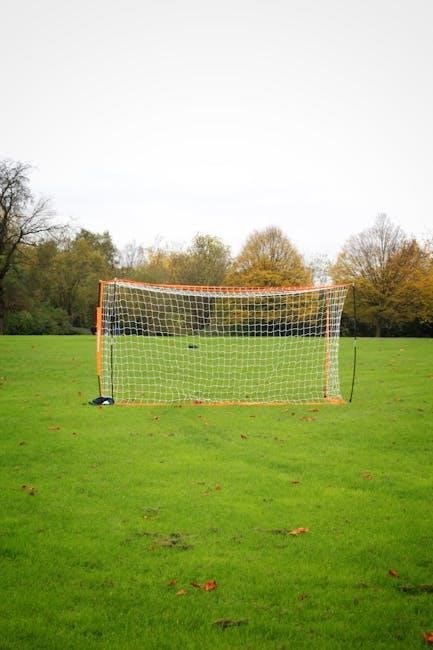
Mental Preparation and Mindset
Mental preparation is crucial for off-season success. Techniques like goal setting and visualization help build resilience‚ focus‚ and confidence‚ enabling players to stay motivated and perform at their best.
Goal Setting and Visualization
Goal setting is a cornerstone of mental preparation during the off-season. By establishing clear‚ measurable objectives‚ players can maintain focus and motivation. Whether improving technical skills or building physical endurance‚ having specific targets helps track progress and stay committed. Visualization further enhances this process‚ allowing athletes to mentally rehearse scenarios‚ such as scoring goals or making decisive plays. This practice strengthens confidence and prepares the mind for game-like situations. Combining goal setting with visualization creates a powerful mental toolkit‚ enabling players to approach challenges with clarity and determination. These practices are essential for building resilience and maintaining a competitive edge during the off-season.
Developing a Winning Mindset
Cultivating a winning mindset is vital for off-season success. Players must embrace a growth mindset‚ viewing challenges as opportunities for improvement. Resilience is key; setbacks should fuel determination rather than discouragement. A positive attitude‚ combined with self-belief‚ empowers athletes to overcome obstacles. Focusing on controllable aspects‚ like effort and preparation‚ fosters mental toughness. Surrounding oneself with supportive influences further strengthens resolve. By prioritizing mental fortitude‚ players can build confidence and maintain motivation‚ setting the foundation for peak performance when the season resumes. A winning mindset transforms potential into results‚ driving players to excel both on and off the field during the off-season.
Small-Sided Games and Scrimmages
Small-sided games and scrimmages are essential for improving technical skills and decision-making. These drills simulate game scenarios‚ enhancing tactical awareness and teamwork in a competitive environment.
Benefits of Small-Sided Games
Benefits of Small-Sided Games
Small-sided games offer numerous benefits for soccer players‚ including improved technical skills‚ enhanced decision-making‚ and increased physical fitness. These games simulate real match scenarios‚ allowing players to practice tactics and strategies in a competitive environment. They also foster teamwork and communication‚ which are crucial for success on the field. By reducing the number of players‚ small-sided games provide more opportunities for each participant to touch the ball‚ improving ball control and dribbling abilities. Additionally‚ they promote problem-solving and adaptability‚ as players must quickly adjust to changing situations. Overall‚ small-sided games are a valuable tool for developing well-rounded soccer players during the off-season.
Incorporating Scrimmages into Training
Incorporating scrimmages into off-season training is essential for enhancing game intelligence and positional awareness. Scrimmages provide players with realistic match scenarios‚ allowing them to apply tactics and strategies in a competitive environment. They improve decision-making under pressure and foster quick reactions‚ which are critical for success. Scrimmages also help players understand their roles and responsibilities within a team structure. By simulating actual game conditions‚ scrimmages prepare athletes for the physical and mental demands of full matches. Additionally‚ they offer a platform to test new skills and strategies‚ promoting adaptability and creativity. Regular scrimmages during the off-season ensure players return to pre-season with improved readiness and confidence.
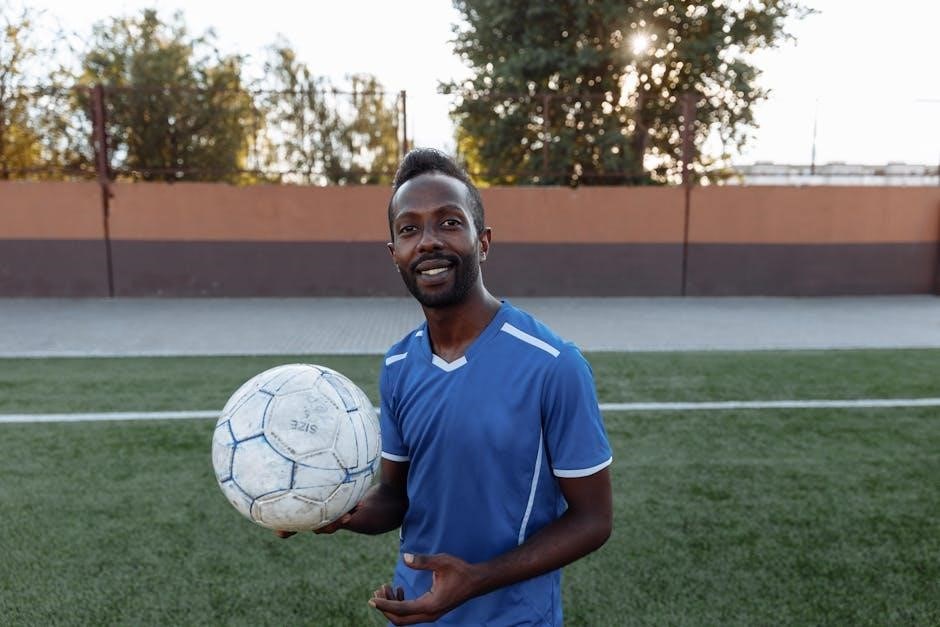
Return to Play Strategy
A well-structured return to play strategy ensures a smooth transition from off-season to pre-season‚ focusing on gradual intensity increases and tailored preparation for peak performance.
Gradual Increase in Training Intensity
Gradual Increase in Training Intensity
A gradual increase in training intensity during the off-season is essential to prevent injuries and ensure players adapt to physical demands. This approach allows athletes to build strength‚ endurance‚ and technical skills progressively. By periodizing training‚ players can avoid plateaus and maintain consistent improvement. Starting with lower-intensity exercises‚ such as light runs and strength work‚ athletes can slowly introduce more dynamic movements and high-intensity drills. This method mirrors the principles of effective periodization‚ ensuring the body is prepared for the rigors of competition. A well-structured progression helps athletes return to play at peak fitness levels‚ ready to perform optimally.
Transitioning to Pre-Season
Transitioning to Pre-Season
Transitioning to pre-season requires a strategic approach to ensure players are fully prepared for the upcoming competitive schedule. This phase bridges the gap between off-season recovery and in-season demands‚ focusing on refining skills and building match fitness. Coaches often implement a periodized plan‚ increasing the intensity and specificity of drills to mirror game scenarios. Players engage in more dynamic exercises‚ such as small-sided games and scrimmages‚ to enhance tactical awareness and teamwork. Mental preparation also intensifies‚ with emphasis on game intelligence and decision-making under pressure. This period is crucial for fine-tuning strategies and ensuring cohesion among team members. By the end of this phase‚ athletes should feel confident and ready to perform at their best during the season.
Monitoring Progress and Adjustments
Tracking progress through regular assessments and feedback is crucial. Adjustments in training intensity and focus ensure continuous improvement and keep players motivated throughout the off-season.
Tracking Fitness and Skill Development
Tracking Fitness and Skill Development
Regularly monitoring a player’s progress is essential for effective off-season training. Fitness assessments‚ such as endurance tests and strength evaluations‚ help track physical improvements. Skill development is measured through drills like dribbling accuracy and shooting efficiency. Coaches use data to identify strengths and areas needing attention. Players should maintain a workout log to document progress and stay motivated. Incorporating video analysis can also provide insights into technical skills. Adjustments to the training program are made based on this feedback‚ ensuring a personalized approach to development. Consistent tracking allows for tailored adjustments‚ keeping players on track to meet their goals and improve overall performance by the start of the season.
Making Necessary Adjustments
Making Necessary Adjustments
Making adjustments during the off-season is vital to ensure training remains effective and tailored to individual needs. Coaches and players should regularly evaluate progress and modify the program based on performance data and feedback. If fitness or skill goals are not being met‚ the intensity or focus of workouts may need to change. Periodic assessments help identify plateaus or areas requiring extra attention. Adjustments might include altering the balance between strength‚ endurance‚ and technical drills or incorporating new exercises to address specific weaknesses. Flexibility in the training plan ensures continuous improvement and keeps players engaged. By staying adaptable‚ athletes can maximize their development and achieve peak readiness for the upcoming season.
Stay Motivated and Consistent
Consistency and motivation are key to off-season success. Set clear goals‚ track progress‚ and celebrate small victories to maintain discipline and mental drive throughout the program.
Importance of Accountability
Importance of Accountability
Accountability plays a crucial role in off-season soccer training‚ ensuring players stay committed to their goals and routines; By taking ownership of their actions‚ athletes maintain consistency and discipline‚ which are vital for progress. A structured training program helps track accountability‚ as it provides clear guidelines and expectations. Players who hold themselves accountable are more likely to adhere to workout schedules‚ nutrition plans‚ and recovery protocols. Additionally‚ having a support system‚ such as training partners or coaches‚ can enhance accountability and keep motivation high. This mindset fosters a culture of responsibility‚ enabling players to push through challenges and stay focused on their objectives‚ ultimately leading to improved performance and success both individually and as a team.
Celebrating Small Victories
Celebrating small victories is essential for maintaining motivation during off-season soccer training. Acknowledging progress‚ no matter how minor‚ helps build confidence and reinforces positive habits. Whether it’s mastering a new skill‚ completing a challenging workout‚ or reaching a personal best‚ recognizing these achievements keeps players engaged. Setting milestones within the training program allows for frequent celebrations‚ creating a sense of accomplishment. This practice fosters resilience and encourages players to stay committed to their goals. By celebrating small wins‚ athletes develop a positive mindset‚ which is crucial for overcoming setbacks and pushing through rigorous training sessions. This approach not only enhances motivation but also contributes to long-term success in their soccer journey.
Off-season soccer training is essential for enhancing performance‚ building resilience‚ and preparing for the next season. A well-structured program ensures players return stronger and more confident.
A well-structured off-season soccer training program is vital for improving physical fitness‚ technical skills‚ and mental resilience. It focuses on recovery‚ strength building‚ and endurance‚ ensuring players return stronger. Key components include tailored workouts‚ periodization‚ and a balance between rest and intense training. Proper nutrition and sleep are emphasized for optimal recovery. Technical drills‚ such as dribbling and shooting‚ enhance game-specific skills‚ while small-sided games and scrimmages foster tactical awareness and teamwork. Mental preparation through goal setting and visualization strengthens mindset. Tracking progress and adjusting plans ensure continuous improvement. By addressing these elements‚ players can maximize their development and prepare effectively for the upcoming season.
Final Thoughts on Off-Season Training
Off-season training is a transformative period for soccer players‚ offering a chance to recover‚ improve‚ and prepare for the next season. By dedicating time to structured programs‚ athletes can enhance strength‚ endurance‚ and technical skills while fostering mental resilience. Proper nutrition‚ recovery‚ and a disciplined mindset are essential for maximizing gains. Players should stay motivated‚ celebrate progress‚ and remain committed to their goals. The off-season is not just about physical growth but also about building confidence and discipline; With consistent effort‚ players can return to the field stronger‚ more focused‚ and ready to excel. This period is an investment in future success‚ ensuring long-term development and peak performance.
